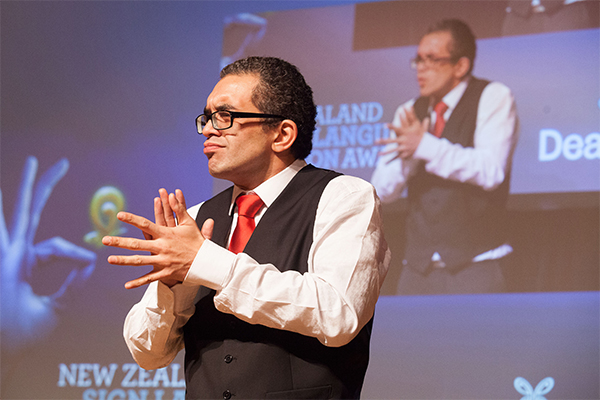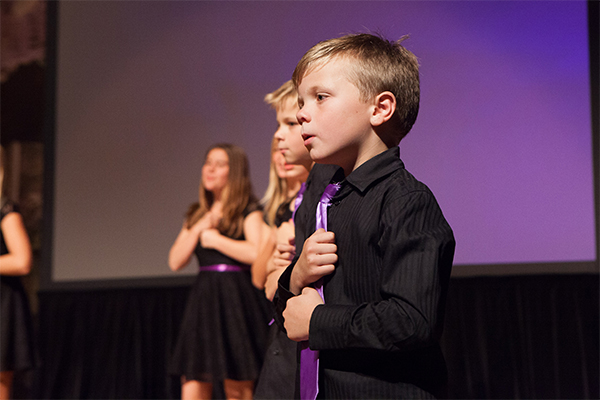Finalist

Most Deaf people have had poor access to information throughout their lives and nearly all have faced exclusion from reaching higher education and leadership positions. The resounding effect is chronic unemployment, under-employment, exclusion and isolation for those in the Deaf community.
One of the many ways Deaf Aotearoa works to combat the discriminatory challenges faced by the Deaf community is through its employment service which aims to increase the number of Deaf people employed, the number of Deaf people in roles appropriate to their level of experience or qualifications and the number of organisations and industries employing Deaf people.
Other goals are increasing the number of Deaf employees moved from temporary, casual or part-time roles into permanent fulltime placements and the number appointed to leadership roles.
Deaf Aotearoa is a not-for-profit organisation providing advocacy and services for Deaf people and the Deaf community across New Zealand. It was founded in 1977 to address the lack of services and interpreters for Deaf people and its Executive Board is comprised of nine Deaf people elected by and from its 2500 members.
Chief Executive Lachlan Keating says a language barrier, lack of awareness, and fear-based social stigmas mean Deaf people are constantly fighting for their rights.
“In a hearing world they often struggle to be understood, to access education in NZSL, to have access to interpreters at university, and to find and sustain work.”.”
To improve employment outcomes for Deaf people, Deaf Aotearoa works with employees and employers at every stage of their journey.
“Part of our work is about training and supporting Deaf jobseekers to gain qualifications and align their experience with their CV. We then support Deaf people with job interview skills and with negotiating the terms and conditions of their employment.
“Another facet is educating employers about New Zealand Sign Language (NZSL) and Deaf culture to make working environments feasible and beneficial for both the worker and the employer, so that their Deaf staff can contribute to the same level as their hearing colleagues.”
Improving career opportunities requires better education, communication skills, and confidence – and that starts as a baby, Lachlan says.
Every year Deaf Aotearoa supports 200 families with a Deaf child, working with the tamariki to build language even before they enter school.
The organisation is also committed to building cultural competency around the Māori Deaf population. “We recognise the importance of weaving together two cultural and linguistic identities. By bringing together Māori Deaf staff to develop bespoke resources for whānau incorporating English, NZSL and te reo Māori, we want to engage better multi-cultural inclusion in workplaces across the country,” says Lachlan.
As well as providing services and programmes directly to the Deaf community, Deaf Aotearoa advocates to the government to implement changes in law and public process to try to minimise the structural gaps in New Zealand that get in the way of Deaf inclusion.

The organisation has contributed significantly to several major government reforms in recent years including the Disability Employment Action Plan, July 2020; the Disability Action Plan, 2019-2023; and the New Zealand Sign Language Strategy, 2018-2023. All of these initiatives have put forward clear intentions for the government to support Deaf people in their lives and careers.
Deaf Aotearoa also advocates for the Deaf community at a personal level.
“We support Deaf individuals to explain their situation to WINZ; we advocate to service providers to ensure they are welcoming for the local Deaf community; and we advocate to senior government officials, Ministers and the Prime Minister to ensure the needs of Deaf people are understood.
“We do our own research and monitoring to reflect how government systems either are or are not upholding the Deaf population. We estimate that we spend over $200,000 of unfunded staff time on advocacy work every year because we know that’s how enduring permanent change happens,” Lachlan says.
The organisation successfully places 50 per cent of all people who come to its employment service, above the expected level set by the funder, the Ministry of Social Development (MSD).
“Many of our jobseekers are referred to us by MSD – we are seen as the ‘too-hard basket’ where MSD and others send the Deaf people that are difficult to place into work due to having multiple barriers.
“We have seen and assisted hundreds of people like John*, a Māori Deaf man who had been out of work for 27 years and had spent time in prison. And Bill*, who came to us for support after 10 years without working. When he got an interview with a small lawn mowing business in his area, we helped Bill* secure a NZSL interpreter, and find ways he could effectively communicate with his employer on the job.”
While the results they see now are heartening, Lachlan and his team know the impact of their work will be even greater in the future.
“Advocacy takes time and determination and the results are sometimes not seen for some time, so we recall the Indian proverb ‘Blessed is he who plants trees under whose shade he will never sit.’”


